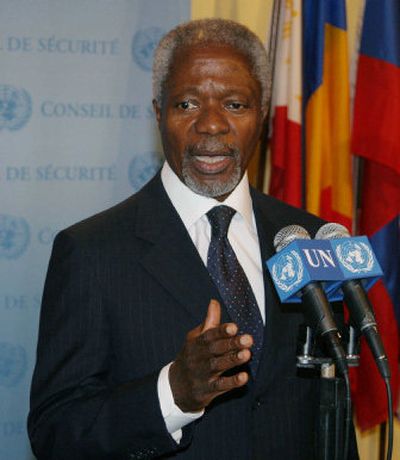U.N. leadership faulted

UNITED NATIONS — A yearlong investigation of the U.N. oil-for-food program issued a strong indictment of the United Nations and its top leadership Wednesday, concluding they tolerated corruption and allowed Saddam Hussein’s government to pocket $10.2 billion.
Secretary-General Kofi Annan called the findings “deeply embarrassing to all of us” and said he accepted the criticism leveled at him personally.
But he said he had no intention of resigning.
The committee’s five-volume, 1,036-page report concludes that those responsible for managing the $64 billion oil-for-food program — both U.N. member states and the world body’s staff — failed the ideals of the United Nations and ignored clear evidence of corruption and waste.
Presenting the report at a meeting of the U.N. Security Council, former U.S. Federal Reserve chairman Paul Volcker, who chaired the committee, said: “Our assignment has been to look for mis- or mal-administration in the oil-for-food program and for evidence of corruption within the U.N. organization and by contractors. Unhappily we found both.”
The powerful 15-member Security Council came in for stinging criticism because its main oil-for-food committee often ignored evidence of corruption, while some council members condoned oil smuggling to Iraq’s neighbors.
The report does not say why the corruption was overlooked but notes that Russia was one of the nations that long blocked efforts to probe the claims. Russian companies were heavily involved in oil-for-food and the country was a leading proponent of lifting the U.N. sanctions.
The report criticized the almost total lack of oversight of the program by the secretary-general and Deputy Secretary-General Louise Frechette, who was the direct boss of Benon Sevan, the program’s executive director now being investigated for allegedly accepting kickbacks. It issued “adverse findings” against all three.
Nonetheless, an outside review commissioned by the committee concluded that the oil-for-food program “reversed a serious and deteriorating food crisis,” thereby preventing hunger and deaths from malnutrition. The program also helped keep Saddam from obtaining weapons of mass destruction, the report said.
One of the largest humanitarian programs in history, oil-for-food was established to help ordinary Iraqis cope with U.N. sanctions imposed after Saddam’s 1990 invasion of Kuwait — and it was a lifeline for 90 percent of the country’s population of 26 million.